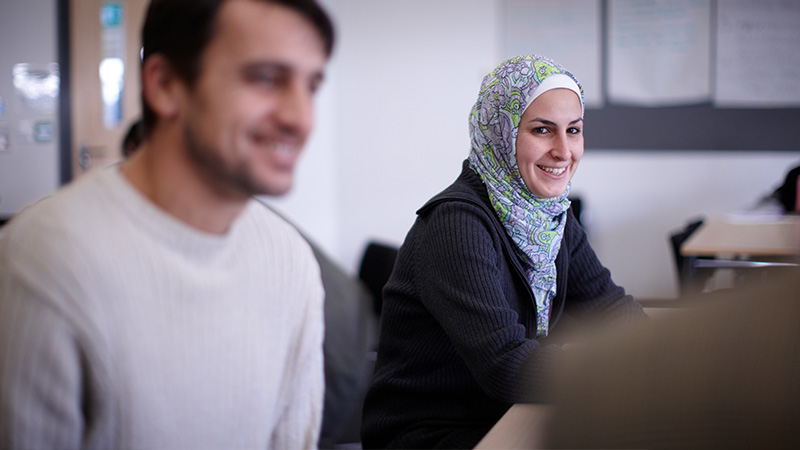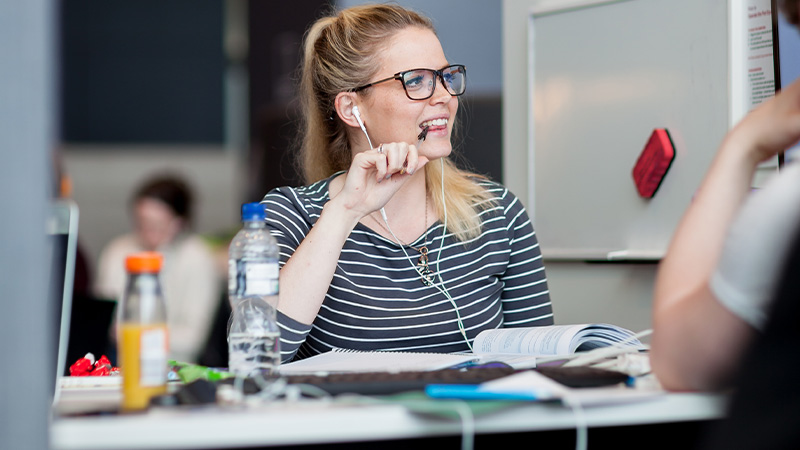Education - Children's Literature
PGCert
Key facts
Start dates
September 2025 / September 2026
Course length
Part time: 12 months
Overview
Our PGCert Education - Children's Literature course gives you an overview of the turbulent and unique journey that children's literature has taken since its earliest days to the present from a range of theoretical perspectives.
You will acquire the understanding of how texts are constructed using a range of narrative modes. And how this aspect of your subject knowledge can be used in the primary classroom to develop children’s abilities to read a range of texts for pleasure.
You will also explore a variety of texts currently available including:
- classic texts
- picture books
- novels in verse form
- literature in translation
- digital texts.
Our teaching staff are experienced and active in researching and teaching in the area of children's literature.
You will have access to our Oxford Brookes specials collections, a new collection of rare and antiquarian children's books and, when onsite, specialist-trained drama sessions.

How to apply
Entry requirements
Specific entry requirements
Students should normally have a first degree.
Please also see the University's general entry requirements.
English requirements for visas
If you need a student visa to enter the UK you will need to meet the UK Visas and Immigration minimum language requirements as well as the University's requirements. Find out more about English language requirements.
Pathways courses for international and EU students
We offer a range of courses to help you meet the entry requirements for your postgraduate course and also familiarise you with university life in the UK.
Take a Pre-Master's course to develop your subject knowledge, study skills and academic language level in preparation for your master's course.
If you need to improve your English language, we offer pre-sessional English language courses to help you meet the English language requirements of your chosen master’s course.
Terms and Conditions of Enrolment
When you accept our offer, you agree to the Terms and Conditions of Enrolment. You should therefore read those conditions before accepting the offer.
Application process
Tuition fees
Questions about fees?
Contact Student Finance on:
Tuition fees
Fees quoted are for the first year only. If you are studying a course that lasts longer than one year, your fees will increase each year.
The following factors will be taken into account by the University when it is setting the annual fees: inflationary measures such as the retail price indices, projected increases in University costs, changes in the level of funding received from Government sources, admissions statistics and access considerations including the availability of student support.
How and when to pay
Tuition fee instalments for the semester are due by the Monday of week 1 of each semester. Students are not liable for full fees for that semester if they leave before week 4. If the leaving date is after week 4, full fees for the semester are payable.
- For information on payment methods please see our Make a Payment page.
- For information about refunds please visit our Refund policy page
Additional costs
Please be aware that some courses will involve some additional costs that are not covered by your fees. Specific additional costs for this course are detailed below.
Optional costs
| Additional costs | Amount (£) |
|---|---|
It’s your responsibility to cover print / binding costs where coursework submission is required. Please note that a lot of the coursework is now submitted online. |
From £30 |
| You may choose to purchase books to support your studies. Many books on our reading lists are available via the Library, or can be purchased secondhand. | £20-60 per book |
Accommodation fees in Brookes Letting (most do not include bills) |
£94-265 per week |
Accommodation fees in university halls (bills included, excluding laundry costs) |
£122-180 per week |
Graduation costs include tickets, gowning and photography. Gowns are not compulsory but typically students do hire robes, starting at £41. |
Typically £0-200 |
Students are responsible for their own travel to and from university for classes. BrookesBus travel is subsidised for full-time undergraduate students that are on a course with a fee of £9,250 or more, or living in an Oxford Brookes hall of residence. There is an administration fee for the production of a BrookesKey. |
From £10 |
Funding your studies
Financial support and scholarships
Featured funding opportunities available for this course.
All financial support and scholarships
Learning and assessment
The PG Certificate in Children’s Literature consists of three modules (60 credits). You can take the course part time either on-campus or distance learning over one year.
On-campus
In semesters one and two, taught modules are usually taught over eight weeks on Wednesdays 5.00pm - 8.00pm. In semester three there is an independent study module with tutorials.
Distance learning
This involves part-time online learning through the use of our Moodle platform. Each module usually requires about 12 hours a week plus time spent on assessment.

Study modules
Please note: As our courses are reviewed regularly as part of our quality assurance framework, the modules you can choose from may vary from those shown here. The structure of the course may also mean some modules are not available to you.
Learning and teaching
Our teaching and learning methods are designed to promote constructive and critical reflection on practice and a range of theoretical and research issues. Methods include:
- lectures
- seminars
- workshops.
Modules are structured to ensure that you have the opportunities to draw on the knowledge and experience of other students and each other.
We have regular guest lecturers focussing on the four language modes (speaking, listening, reading and writing). We also make full use of ourOxford Brookes specials collections, a new collection of rare and antiquarian children's books and host a session in the Oxford Story Museum.
Assessment
Assessment methods used on this course
You will improve your practice through the course assessment tasks.
Assessments are supported in a number of ways:
- online question and answer discussions
- presentations of work in progress with tutor and peer feedback
- formative tasks with detailed feedback.
Each coursework based module is assessed separately, in the following ways:
- individual essays
- seminar presentations
- reports
- portfolios
- investigative research
- group work.
Research
The School of Education, Humanities and Languages is a thriving centre for educational research and teacher professional development. Students on master's level programmes therefore join a large research community comprising researchers at all levels of higher education study.
We hold two major research conferences each year - the School of Education Research Conference and the EdD Colloquium. All students are invited to attend our annual Research Seminar Series (which attracts both internal and external speakers). We also organise a number of conferences, lectures, seminars and debates, some of which have an international reach.
The School’s six research groups exist to encourage engagement in research, publication, conference presentations, seminars and workshops:
- Inclusion and Wellbeing
- Policy, Partnership and Leadership
- STEAM pedagogy and learning
- Humanistic Perspectives on Education
- Early Years
- Applied Linguistics
View all staff profiles for School of Education, Humanities and Languages
After you graduate
Career prospects
Your learning on the course may lead to better prospects for career advancement.
Students frequently change role / direction as a result of developing new understandings and skills from their work on the course.
Related courses
Programme changes:
On rare occasions we may need to make changes to our course programmes after they have been
published on the website. For more information, please visit our
changes to programmes page.
